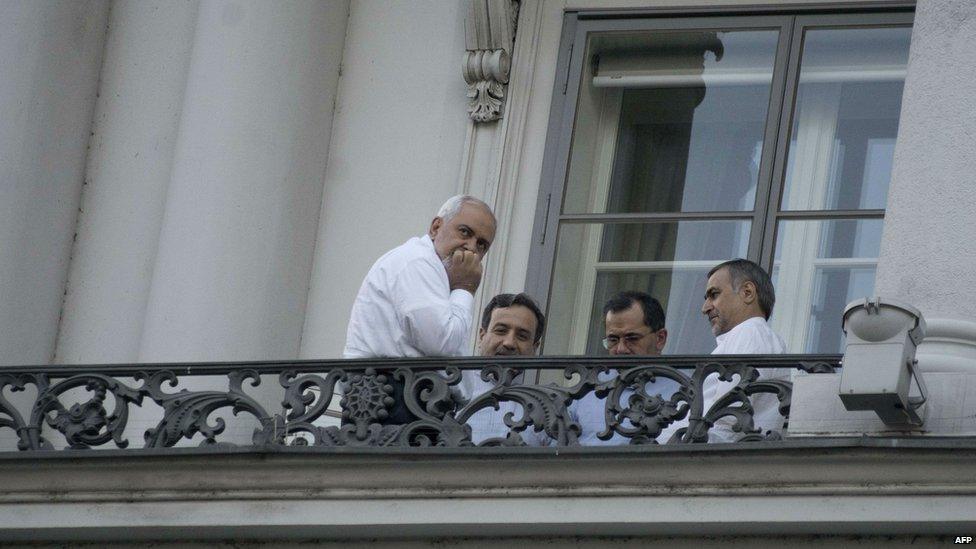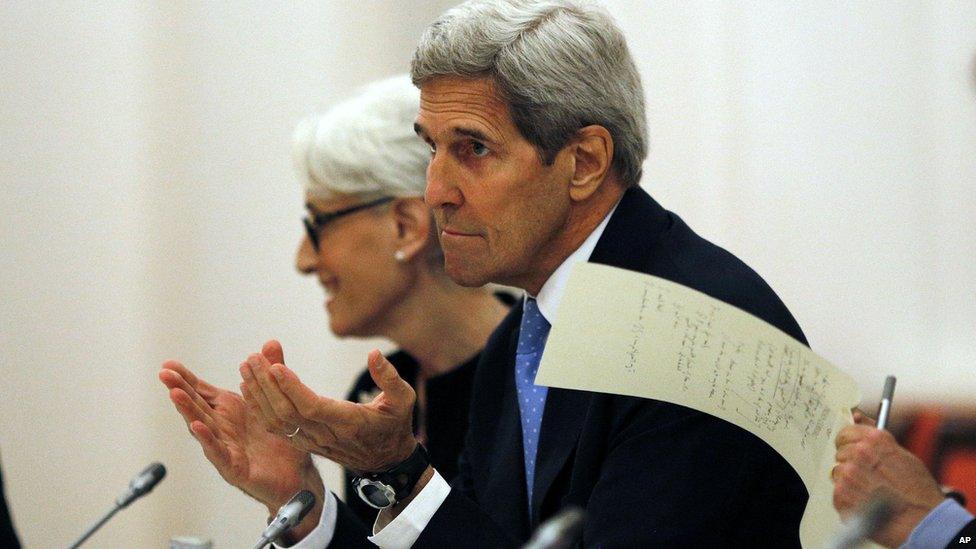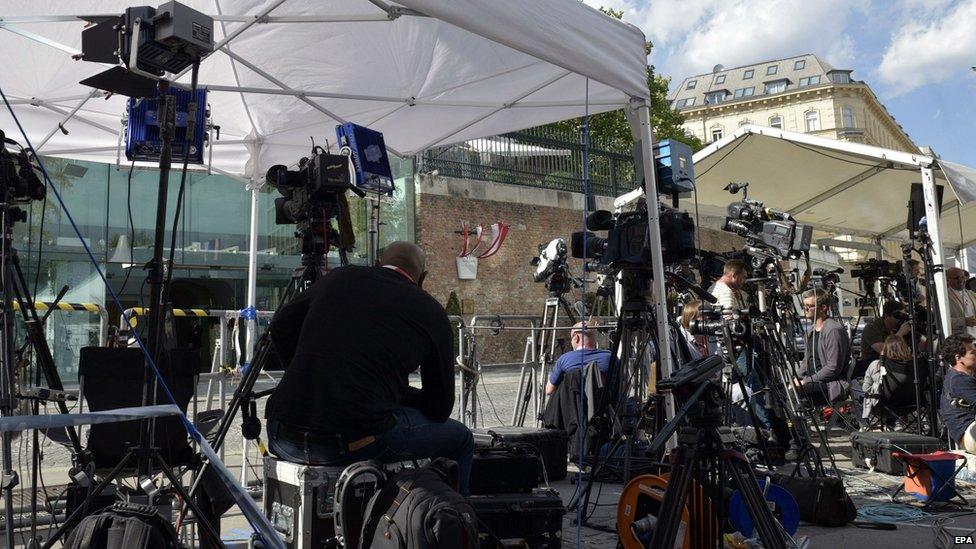Is this the moment of truth for an Iran deal?
- Published

The world's media watches Iranian officials on the balconies of the Palais Coburg in Vienna
It's been called the last mile, the last, most difficult stretch of scaling the highest peak, even the last chance.
As hard as it is, nobody wants to be the first to walk away from the best hope in many years to secure a long-term deal with Iran on its nuclear programme.
A readiness to call it quits is still a tactic - and a genuine threat - in the negotiators' toolbox.
But, after a year-and-a-half of intensive negotiations, as well as significant progress, the Iran deal is now seen, by many, as "too big to fail".
"We've come so far that to just drop all this work..." sighed one negotiator whose voice trailed off as he admitted he had not left Vienna's luxurious Palais Coburg hotel for weeks aside from occasional one-day dashes to his capital.
Monday is now a new deadline after a third extension in two weeks. Exhausted negotiators, now talking around the clock, struggle to strike a balance between brushing off another missed mark in the calendar, while still insisting this process is not open-ended.
A deal to put an Iranian nuclear weapon out of reach for nearly a decade in exchange for a lifting of sanctions is, by all accounts, closer than it has ever been before. But a document said to run to more than 80 pages is exceedingly complex, and controversial. No-one can risk a misstep or misunderstanding in what could be the final stretch.
"We want a deal that stands the test of time," announced US Secretary of State John Kerry when he let the world's press know on Thursday that the last self-imposed deadline of 9 July - a US Congressional deadline - would not be met. He made it clear "we still have difficult issues to resolve".
Such is the sensitivity of a process, with many critics in many capitals, that missing another deadline is seen as a positive. Negotiators point to another delay as proof that they are not desperate, and won't be rushed into a "bad deal".
Iranians describe how they hope life will become more affordable if sanctions are lifted.
Now, with all foreign ministers set to sit around the table again, French Foreign Minister Laurent Fabius called it the "last 100 metres of the marathon".
"Now that everything is on the table, the moment has come to decide," he declared to journalists manning a thicket of cameras and microphones in place, day and night, behind a metal barrier.
The world's media wait and watch for any and every public statement, personal snippets, or chance sightings on the elegantly sculpted white balconies high above the cobblestones.
Other negotiators have been making similar comments for days, which underlines that some of the toughest decisions now are essentially political ones.
One of the most difficult disputes appears to deal with conventional, not nuclear weapons - the arms embargo enshrined in the UN Security Council Resolutions on Iranian sanctions adopted in 2006.
Iran argues that ending the ban is central to its quest to end its pariah status in the region and restore its national pride.
But the P5+1 is clearly divided. Western countries, mindful of significant regional tensions, have opposed lifting a ban which would allow Tehran to buy and sell arms.
"We have always said this would one of the most sensitive issues," said one senior Western diplomat last week.
Russia and China are known to back Iran's view that the embargo should now end. Russia's foreign ministry even spelled it out in a tweet: "#Lavrov: The arms embargo on Iran must be one of the first sanctions to be lifted."

US Secretary of State John Kerry insists progress has been made
The emergence of two blocs on a crucial matter led a senior Iranian official to complain that "our friends spend more time co-ordinating their positions than negotiating with us".
"Every country has their own red lines," he told journalists.
This issue, which suddenly reared its head at this late stage, could be a deal breaker in the US Congress which will review any agreement that emerges.
Perhaps not surprisingly, in this high-stakes diplomacy emotions are running high too.
"There was no slamming of doors but it was a very heated exchange of views," was how one senior Western diplomat described some tough exchanges last week over sanctions.
Iran has the world's fourth largest crude oil reserves: 150 billion barrels
Then there was a much publicised incident between the EU's foreign policy chief and Iran's foreign minister with Federica Mogherini suggesting they may as well go home to which Javad Zarif quickly retorted "don't threaten an Iranian".
A quip from Russia's Sergei Lavrov "or a Russian" then took a bit of heat out of the moment. All sides later made light of it while #don'tthreatenanIranian took on a life of its own on social media.
There was another buzz among journalists when Mr Zarif posted a cryptic tweet which included the phrase "mark my words, you can't change horses in the middle of a stream".
When he then appeared in his white shirt on his white balcony high above the press pack, but close enough to be heard, journalists shouted out "what did you mean?" and received an even more cryptic response.

Journalists remain camped out in front of the Vienna hotel where the talks are being held
Later that night, that bit of what journalists now call balcony diplomacy was replaced by an old fashioned face to face briefing with an Iranian official. He spoke with barely concealed bitterness of some "changes of position and multiple positions" at what wasn't the "11th hour, but the 13th or 14th".
Someday, the full story of what has gone on behind tightly closed doors will be told but now the proverbial "first draft of history" is relying on a not always reliable thin stream of background briefings, public statements and shared confidences.
What did John Kerry hear from President Obama in last Wednesday's teleconference? Iranian officials say a very useful proposal that had been on the table was pulled back. "Nonsense," says one US official.
These could be the last hours of Vienna's place in this process. Weary journalists are watching balcony movements, scrutinising tweets, responding sceptically to every statement which speaks of progress, and mulling over leaks from inside which strike a more pessimistic note.
A deal is now "within reach" but no-one can say with any certainty if, and when, they will reach it.